Orthodox Judaism has its first openly gay congregational rabbi. This is his story.
When a therapist proposed integrating his rabbinical and queer selves a few years ago, Rabbi Shua Brick just laughed
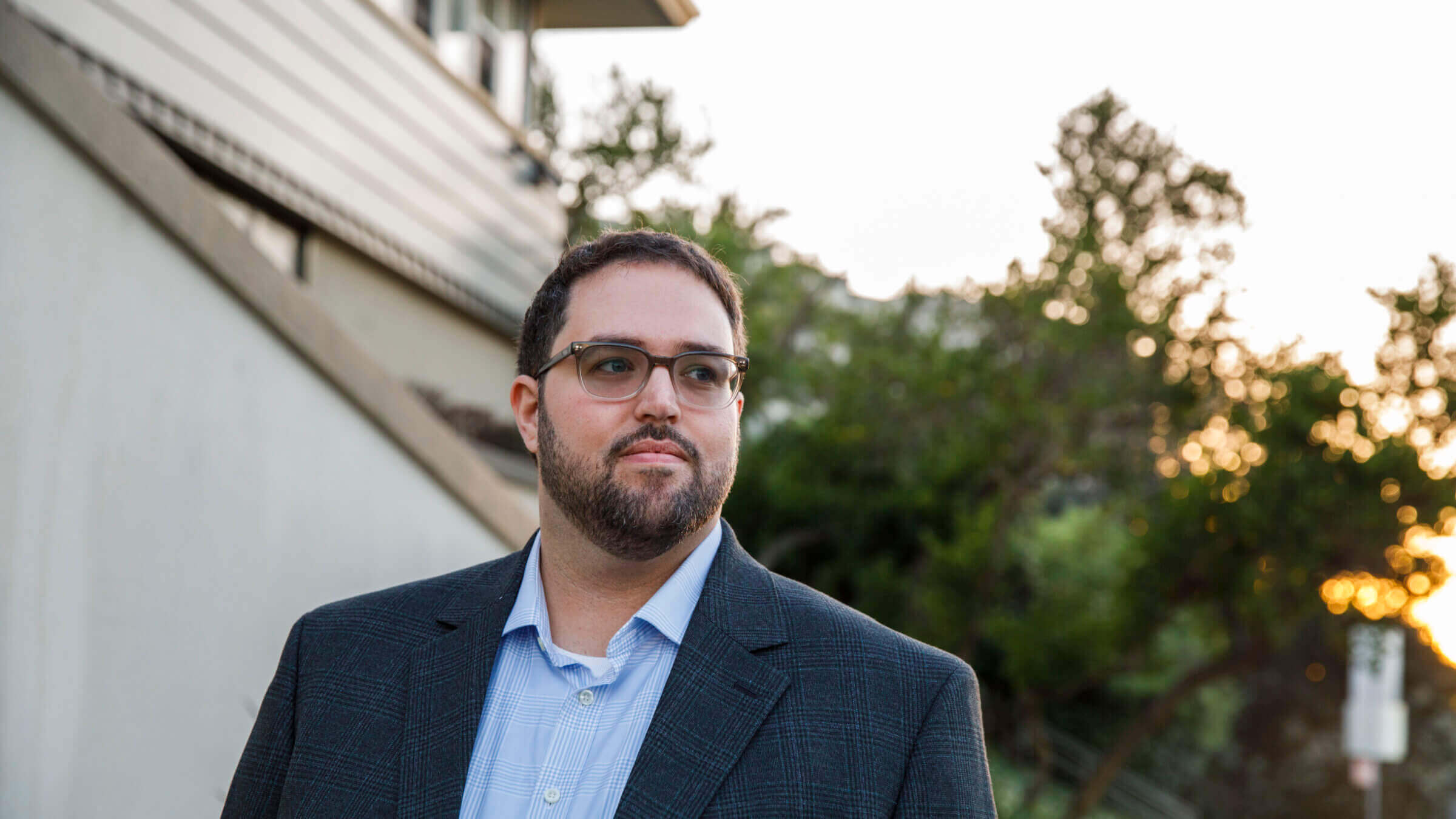
Rabbi Shua Brick wants to shape a new way of talking and thinking about queer Orthodox Jews. “A lot of rabbis have the first 100 words,” he said. “But they don’t know what the next 100 words are.” Photo by Juliana Yamada for the Forward
His father was a rabbi, as were all his mentors, and they all thought he would make a good one. At his bar mitzvah, the head of his yeshiva told his parents: Invite me to the ordination ceremony. Shua Brick was already picturing it.
“I always thought that the purpose of life was, just in general, Torah and mitzvos,” Brick told me as we sat in his dining room one afternoon. “And there’s a profession where we get paid to just do Torah and mitzvos? I can’t believe anyone does anything else!”
Now 29, Rabbi Brick has his dream job — actually, dream jobs. He is director of family learning at an Orthodox synagogue in Oakland, California, and teaches Talmud and Jewish ethics at the pluralist Jewish Community High School of the Bay. At the 200-household synagogue, Beth Jacob Congregation, Brick runs the youth program, leads Torah study for adults, and fills in when the senior rabbi is out of town.
His synagogue classes are conventional in theme, modern in tone — he’s as likely to reference Oppenheimer as Maimonides. A smattering of congregants attended a weeknight talk Brick gave on repentance ahead of the High Holidays, and there was nothing striking about the scene. Only by knowing that its teacher is gay did the class begin to feel remarkable.
At Beth Jacob, that Brick is gay is something of an open secret. He started telling members more than a year ago and instructed a few to spread the word, but suspects there are some who will first learn of his sexual orientation by reading this article.
It does not seem to have caused much hand-wringing in the pews. On the contrary, it has generated some enthusiasm. When I visited Beth Jacob this summer, a woman I met at kiddush after Shabbat services, who didn’t know why I was there, suggested I do a story on Rav Shua, as he is known there, quipping something like, “He’s a rabbi, he went to YU and he’s gay.”
But experts say that Brick is the first openly gay rabbi to serve on the clergy of an Orthodox synagogue in the U.S., part of an increasingly visible cohort of queer Orthodox Jews hoping to change the movement from within.
Queerness is a fraught subject in modern Orthodoxy, whose adherents generally abide by halacha — Jewish law — and engage fully with secular society, unlike Haredi Jews who tend to live in insular communities.
A pair of verses in Leviticus explicitly prohibiting male gay sex provide Biblical pretext for excluding queer people, and Yeshiva University — Rabbi Brick’s alma mater — has made national headlines over the past two years for refusing to recognize its LGBTQ+ student club. A gay Orthodox man who was ousted from his Florida shul early this year took to picketing outside it.
The clinical director of an advocacy group called Jewish Queer Youth says that among the 2,000 young people from Orthodox families it has served since 2016, some 70% have considered suicide. One, a YU graduate like Brick, died by suicide this summer, just before the Shabbat when the portion of Leviticus with the prohibition against gay male sex would be read.
At the same time, the number of out gay Orthodox Jews has grown markedly since another YU-ordained rabbi, Steven Greenberg, rocked the Orthodox world by coming out 24 years ago, and plenty of synagogues have quietly become more welcoming. Brick said he decided to go public because he wants to show other gay Orthodox Jews not only that they belong, but also that they can lead.
And he wants to help shape a new way of thinking and talking about LGBTQ+ Orthodox Jews.
“A lot of rabbis have the first 100 words, like, ‘Hey, we still love you,’” Brick said. “But they don’t know what the next 100 words are. I’ve had to think about this issue nonstop for, like, a decade in my head. And so I’ve done a lot of training about this that other people just haven’t had.”
There are a few compromises he has had to make — Brick does not officiate at weddings or witness conversions, for fear their validity could be challenged in other Orthodox spaces. He said he has made those sacrifices to keep the peace.
He is also single, and declined to say whether he plans to date — or whether he thinks people can pursue same-sex relationships within the bounds of halacha. That silence may be helping him win — for now — tolerance among his colleagues.
After all, a 2022 white paper on welcoming queer Orthodox Jews begins its second paragraph, “Our starting point as Orthodox Jews is clear: Sexual relations between people of the same sex is forbidden.”
But Brick much prefers to talk — and teach — about other things. He has developed a series of lesson plans that consider halachic issues for queer Jews, and is teaching them to his high school students. And they have nothing to do with sex.
“What’s missing in the world is not another person trying to re-understand this verse in Leviticus,” Brick said. “That’s a closed book. We know what it means, we know what it stands for. But talking about queer experiences is not as two-dimensional as talking about the permissibility or non-permissibility of very specific sex acts. There is a lot more to a person — a lot more to these questions — that is worth exploring.”
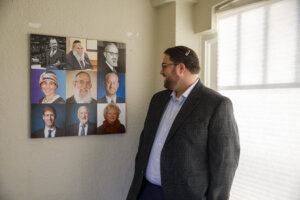
‘Someone who thinks for himself’
Yehoshua Yaakov Brick grew up the middle of five children in West Hempstead, a Long Island hamlet that includes at least six Orthodox shuls, several kosher restaurants and a Judaica store. His father, a real estate attorney, teaches a weekly Talmud class; his mother, who works in the YU admissions office, has a side hustle as an etrog distributor.
Young Shua was doted on by his rabbis, but he didn’t see everything the way they did. Rabbi Jeremy Wieder, a member of the rabbinic faculty at YU, recalled fondly the intellectual sparring that came with having the “very bright, very thoughtful” Brick in class as an undergraduate.
“He’s always been someone who thinks for himself,” Wieder told me. “Not someone who doesn’t respect authority or anything like that. But he’s the kind of student who you can’t pull a fast one on because he’s going to challenge you.”
Brick was conscious from a young age that marriage to a woman was considered a prerequisite in the Orthodox rabbinate. Indeed, the interview process for pulpit jobs often includes the rabbi’s wife, or rebbetzin, who is expected in many communities to teach classes for women and fulfill other informal and unstated responsibilities.
So when he began to feel physically attracted to boys — and nothing toward girls — in middle school and high school, Brick figured he would grow out of it when he moved into mixed-gender environments.
It began to dawn on him after high school, while he was studying at HaKotel, an elite Jerusalem yeshiva popular with young Orthodox Americans, that it might not be that simple. He dated a young Orthodox woman from his hometown who was spending the year at a nearby seminary — generally, chatting over coffee or on walks in the Old City, given Orthodoxy’s strictures against touching before marriage. But after a few months, he realized he could not follow through the expected path to engagement and broke it off.
Meanwhile, he was in love with his best friend at the yeshiva without realizing it, and falling out with him at the same time.
A supervisor of their program — madrich, in Hebrew — picked up on the tension and asked Brick: Had there been anything physical between them? Brick dismissed the question — there hadn’t been. But internally, something clicked.
Until that point, he told me, “I thought that I was sexually attracted to men and romantically attracted to women.” But he started to see that as a result of the fact “that in every story I’ve ever read and movie I’ve ever seen, romance only meant a straight couple.
“So that was the only thing that could make sense to me, and I never thought of men romantically because I tried not to,” Brick added. “When that madrich asked that question was when it hit me.”
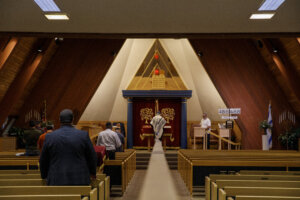
‘A crazy paradox’
Rabbi Greenberg, who was ordained at YU in 1983, first came out as gay in an interview with the Israeli newspaper Maariv published in March of 1999. His story, revealed more fully in a 2001 documentary and his 2004 memoir, revealed the plain reality of gay Orthodox Jews and illustrated their inability to fit inside halachic boundaries.
Greenberg tried to resolve the challenge of those Leviticus verses in the memoir, Wrestling With God and Men: Homosexuality in the Jewish Tradition. He reframed same-sex bonds in the Jewish canon, like the wrestling of Jacob with the angel and the friendship of David and Jonathan, as gay relationships. And he drew on ancient Jewish wisdom to argue that God could not create gay people only to view their authentic sexual expression as a sin.
Rabbinic authorities generally either ignored Greenberg or tried to discredit him. (One quoted in a Forward article at the time likened identifying as a gay Orthodox rabbi to saying, “I’m an Orthodox rabbi and I eat on Yom Kippur ham sandwiches.”) But attitudes have shifted since then.
Eshel, a nonprofit Greenberg co-founded in 2010 to support LGBTQ+ Orthodox Jews, now counts hundreds of Orthodox clergy whose synagogues welcome gay people as members, count men in a minyan and give them ritual honors like being called up to the Torah or leading the congregational prayers.
So-called “conversion therapy,” which many Orthodox rabbis recommended when Greenberg first forced the conversation, is now generally discouraged in modern Orthodox communities, as is pushing gay people into marriages with people of the opposite sex.
“There was a period where empathy was considered dangerous — empathy is no longer threatening,” Greenberg told me, adding, “What’s changing is not fully coherent. And certainly not in the role of rabbi.”
At YU, where he enrolled after two and a half years at HaKotel, Brick buried his identity crisis under schoolwork and extracurricular activity. He was president of the religious student council and awarded a prestigious Wexner Fellowship, which provided a $30,000 annual stipend to defray his living expenses during rabbinical school.
As rabbinical school approached, he decided to share his secret with five people — a YU administrator with a degree in social work, who he knew was an ally; a rabbi he had known since childhood; a gay friend who had grown up Orthodox; and a young couple he was close friends with. He told them he was attracted to men, but still would probably marry a woman.
One of those people, the woman in the couple, told Brick that made her sad — that she wanted more for him than a loveless marriage. He didn’t know how to respond. What more? He felt he was taking the holiest route given the conditions — a life of piety, a career of Torah and mitzvot. That’s what he thought God wanted for him.
Back in Israel for his first year of rabbinical school, Brick began seeing a therapist for the first time, referred by a gay Orthodox Jew he’d met through Wexner. He paid out of pocket rather than use his YU health insurance, lest some administrator find out.
“I sat down, like: ‘Hi, I’m a gay rabbinical student. That’s what we’re here for,’” he recalled of the first therapy session. It was the first time he had used the word “gay” out loud to describe himself to someone else. He was 23.
“I remember him saying that our goal working together will be for you to find an integration between your rabbinic self and your queer self,” Brick said. “I laughed in his face. Like, what a crazy paradox, that obviously is not possible.”
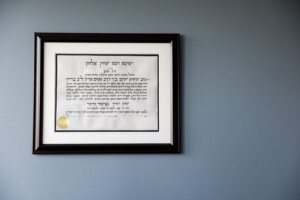
‘What are we willing to do?’
If there is a mainstream Orthodox synagogue where such an integration might be possible, it would be Beth Jacob. Nestled in a verdant, upscale part of Oakland, it maintains the practices and aesthetics of modern Orthodoxy while attracting people from beyond it.
In sharp contrast to the West Hempstead shtetl where Brick grew up, Oakland does not have enough Orthodox Jews to sustain a kosher pizza parlor. That means Beth Jacob needs to accommodate both people who drive to services as well as those who want an eruv, the boundary Orthodox communities create within which carrying is allowed on Shabbat. The 15 or so men at a recent morning minyan included one with the sidecurls of Hasidim and another who did not wrap tefillin.
About 120 adults turned out for the Saturday service I attended in August; at its conclusion, Brick led the kids from childcare onto the dais for the Adon Olam hymn.
The senior rabbi, Gershon Albert, is all of 34 and has been at Beth Jacob since completing YU’s rabbinical school in 2014. He grew up in Montreal in a family that was not Orthodox. But after his parents split up, he joined a youth program through a local Orthodox synagogue and befriended the children of the rabbi. The family enfolded him in their observance, leading Albert to become frum in high school.
The grace that rabbi’s family showed him informs Albert’s outlook on Judaism. “I was not a typical kid, I didn’t have a typical family, and there were a lot of reasons to turn me away,” he told me. “I was embraced despite that. That’s become an operating principle of my life.”
Brick’s rabbinical internship at Beth Jacob, which he began during his final year of rabbinical school, came thanks to some Jewish geography: His brother and Albert’s brothers are neighbors in New Jersey. Brick was to make five trips to Beth Jacob over a year to teach and give sermons, though he only made three due to the pandemic. During the second visit, Brick came out to Albert when the two were on a hike.
Though Albert responded by reiterating his commitment to helping Brick succeed, Brick remained convinced the Orthodox rabbinate would not accept him as a pulpit leader. What synagogue would risk its membership over his hiring? What rabbi would put his credibility on the line to give him a chance? How could Orthodoxy stomach a person like him teaching — even modeling — Torah?
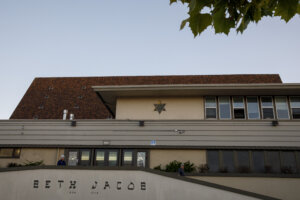
Merely coming out to himself had been a terrific struggle. But in August 2020, Rabbi Albert called to offer him a full staff position — actually, a position split between the synagogue and the high school — and Brick, finally at peace with his complete identity, said he could only accept if he could be fully out in the job.
Albert asked if he could run it by the synagogue’s previous and current board presidents. (It was not an issue at the high school, which already had other queer staff.) The next day, the senior rabbi called the intern back to relay their approval. And when Albert asked the Rabbinical Council of America, the umbrella organization for Orthodox rabbis, if a gay graduate of YU should apply for membership, its executive vice president said yes.
None of the major modern Orthodox organizations has spoken publicly on the idea of a gay Orthodox rabbi. The Orthodox Union, the umbrella organization for Orthodox synagogues, declined to comment for this story.
“I can’t say it’s the right thing for every community,” Albert told me. “It’s probably important to acknowledge that every community has to make its own decisions. But I hope that we are making a decision that is authentic to Torah and to halacha.
“Modern Orthodox rabbis have been saying for at least 15 years now that we should be open and inviting to members of the LGBTQ community. And if we really mean that, then what are we willing to do?”
Robin Gluck, the woman who suggested I profile Brick back at the Shabbat kiddush this summer, said Beth Jacob congregants generally fall into three buckets: East Coast transplants who grew up Orthodox; Jews who, like her husband, embraced Orthodoxy later in life; and Jews who still do not consider themselves Orthodox but dig the vibe.
Gluck, whose 22-year-old son is gay, said she was not surprised when her husband told her that Brick is as well. She is the librarian at the high school where he teaches, and he had checked out queer Torah commentary and wasn’t married, so she had an inkling.
She said most in the congregation had reacted to Brick’s sexuality with passing interest. “It wasn’t like, ‘Oh my gosh’ rumbling through the congregation,” she explained. “It was more like, ‘OK. Whatever. You know.’”
Rabbi Albert told me he knows there are many Orthodox synagogues that would not accept Brick as easily. He said he does not see himself as an activist or his synagogue as progressive — he just thinks he found the right rabbi for the role.
“We need people who live and breathe Torah in the way of the beit midrash, but also understand that most of our members didn’t grow up in that world,” Albert said. “So they need it to be brought to them at a high level, but in a way that’s accessible. Rav Shua does that extremely well.”
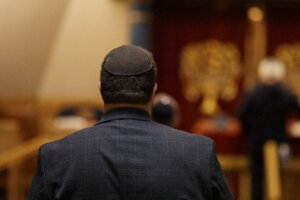
‘What if I’m not destined to just live alone?’
Not long after Brick started therapy in 2017, he listened to a podcast interview with a man who had attended the same Jerusalem yeshiva, who was gay, and whose marriage to a woman had flamed out. It was then that Brick realized his experience was not unique — and that he could not take the same path.
But giving up on marriage was giving up on his dreams, and as he returned to Washington Heights for his second year of rabbinical school, he plunged into a deep depression.
He told me that he felt there was something monstrous about who he was. “It Gets Better”-type messaging had never helped — he felt it encouraged leaving Orthodoxy. But a video he watched in his first year of rabbinical school, of a gay YU alum roughly his age describing his desire for a Jewish family to have around the Shabbat table, helped Brick turn a corner.
“If I could do that with a woman that would be great, but I don’t think you want me to marry your daughter,” the young man, named Michael Greenberg (no relation to the rabbi), says with a chuckle. “And so that’s going to have to be with a guy. But I want a partner and children and everything that you all want and have wanted, and what you want for your children.”
Greenberg was leaning into his religious identity with an optimism Brick hadn’t realized was possible for someone gay and Orthodox. Brick connected with Greenberg on Facebook, and came out to him the next night.
“His first response after a thank you for telling me, was, ‘Can I tell you about my Shabbos this past week that me and my boyfriend had?’” Brick recalled. They’d had guests over for lunch, bringing home a couple stragglers. Implying: They were accepted, involved and running their own home in an Orthodox community. People trusted their kosher kitchen.
“Then he says one of these things you hear in queer spaces all the time, which is like, ‘You know you deserve to have a life with love and happiness, right?’ I think I literally responded, ‘No, I don’t,’ or something like that,” Brick continued. “I was never receptive to anyone saying that to me. But that was the first time I was like, ‘What if I’m not destined to just live alone for the rest of my life? Maybe that’s not my fate.’”
His mood began to lift. He came out to his chevruta (study partner) at YU and colleagues at The Jewish Center, a modern Orthodox synagogue on the Upper West Side where he worked as an intern. There and in general, he said, the reaction has been surprisingly positive, though he acknowledged that he mostly avoided telling people he expected to react poorly.
‘If people can see a role model — a gay Orthodox rabbi having a life in an Orthodox community, and even a job and a vocation — there’s more hope that they, too, can have a future in a community.’ –Miryam Kabakov, executive director of Eshel
He had come out to his younger brother in 2017, and now told his sister and older brothers as well. He said he tried to frame coming out as an exciting development, “but I was not excited about it.”
“It was a hard thing,” he recalled of coming out to one of the brothers. “We had a very sad, depressing conversation. It was kind of grieving the easier life, the simple life, the picturesque life we imagined.”
He was beginning his first year of rabbinical school when he told his mother, and she peppered him with questions. Starting with: Are you sure?
Which he thought was hilarious. “‘You think I went through all this for something I haven’t thought enough about?’” he recalled thinking to himself. “But I’ve come to appreciate that my mom went through in five minutes what took me, like, two years of therapy.”
The last family member he came out to was his father, four years after he told his younger brother. I asked whether he’d been scared, and he said, “You’d be crazy not to be scared!” But he declined to recount the conversation, saying he did not want to pull his family further into the story.
When I called Brick’s mother, she said she did not remember specifics about the coming-out conversation, and did not want to discuss the impact it has had on the family.
Instead, she shared a prepared statement: “I have always been proud of my son, I will continue to be proud of my son, and I love him very much.” She said Brick’s father had suggested she add the last part.
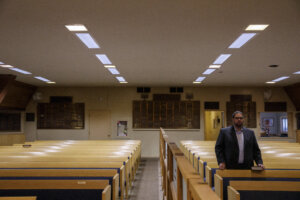
‘There are people who are literally killing themselves over this’
Today, leading modern Orthodox thinkers broadly agree that a marriage between a gay person and someone of the opposite sex is untenable. At the same time, marrying a man is incompatible with halacha — and celibacy, beyond being a tough sell, runs contrary to what the Torah prescribes: monogamy, procreation, family, continuity.
“There’s a stalemate,” Brick said. “Because everyone’s follow up is, if you love them you’re going to do their wedding, and if you won’t do their wedding, you don’t love them. To engage in the conversation publicly, there’s no way to succeed.”
That stalemate, Brick thinks, has left unanswered a panoply of halachic questions pertaining to LGBTQ+ Orthodox Jews that don’t relate to sex or marriage.
He is in the process of creating 10 lesson plans that take on such matters. For example: Since Ashkenazi men traditionally do not wear a tallit — or prayer shawl — until marriage, are there other moments when a single person can begin donning one? How to honor one’s father and mother if they reject you over your sexual orientation? Given the Torah’s frowning on lying, what might it say about hiding one’s sexuality?
The goal, Brick said, is to loosen the paralysis in the Orthodox rabbinate around LGBTQ+ issues and, by doing so, dignify the people facing them. He emphasized that he is not attempting to deliver halachic rulings on these or other topics, but to engage with them theoretically and by breaking big questions into component parts — the way rabbis routinely do on subjects like whether it is permitted to use kick scooters or smartwatches on Shabbat.
Perhaps surprisingly, Brick does not think sexual prohibitions are the primary source of pain for gay Orthodox Jews. “It’s how people think of you on a day-to-day basis, with the words that they say, the way that they act — that’s the thing that hurts,” he said. “If you got rid of that, everything else would be so manageable.”
He added: “The main reason why I’m doing this is because there are people out there who think that there are no options for them. There are people who are literally killing themselves over this. People who are incredibly depressed, in horrible situations, because they don’t have access to the full picture of what Judaism has to say about them. I want to get my word out to them.”
The more he studied these issues, the more he understood his unique capacity to talk about them, which pushed him to embrace his identity more publicly. He has since given talks with Eshel, the LGBTQ+ inclusion nonprofit, and created a writing group centered around queer Torah — reading the Torah through the lens of queer experience.
“I don’t feel attacked by the Torah,” Brick told me toward the end of a series of conversations for this piece we had this summer. “In fact, I feel more called into something that’s special and exciting. I feel like everyone is looking for their purpose in life. And it’s really kind of cool that I feel like I found mine.”
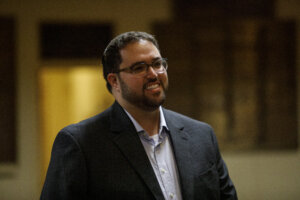
‘What he’s doing is heroic’
The author of the white paper urging Orthodox communities to welcome queer Jews, Rabbi Kenneth Brander, declared the movement at an “inflection point.”
“If we do not manage to find a way to make space for gay and lesbian Jews while maintaining our unyielding commitment to halacha — a process I am confident is feasible and even appropriate,” he wrote, “the detrimental repercussions for even straight members of Orthodoxy will be wide and long-lasting.”
Brander was Yeshiva University’s vice president of student life and activities when Brick was a student leader on campus. Now Brander lives in Jerusalem and runs Ohr Torah Stone, an Israeli network of more than 30 modern Orthodox institutions.
He told me he began writing the paper after “two or three” deaths by suicide among Ohr Torah Stone alumni in his first few years on the job, which he started in 2018. He did not know Brick was gay when he published it in December 2022. But soon after, Brick called to commend him for the work and came out to him.
Like Wieder, Brick’s rabbi at YU, Brander said he sees no problem with Brick serving as a congregational rabbi as long as he doesn’t date. Brander told me he was eager to help Beth Jacob and its rabbis navigate any issues they may encounter with the broader Orthodox world.
Brick staying celibate, he said, is “an opportunity to show both gay and straight students about how a person wrestles with multiple conflicts in his life.”
“I think what he’s doing is heroic,” Brander added.
Miryam Kabakov, Eshel’s executive director and co-founder, said Brick coming out could have an extraordinary impact on queer youth who are wondering whether the Orthodox world has a place for them.
“If people can see a role model — a gay Orthodox rabbi having a life in an Orthodox community, and even a job and a vocation — there’s more hope that they, too, can have a future in a community,” Kabakov said.
Brick said he expects that nasty things will be said and written about him and Beth Jacob because of this article. But he no longer thinks that it’s his responsibility to get those people to understand who he is.
“I realize it might get hard. I also know that if I just turn off my phone and close my computer, Beth Jacob will be there,” he said. “I’ve still got to teach tomorrow. I have classes. We’ve got minyan to run.”
















